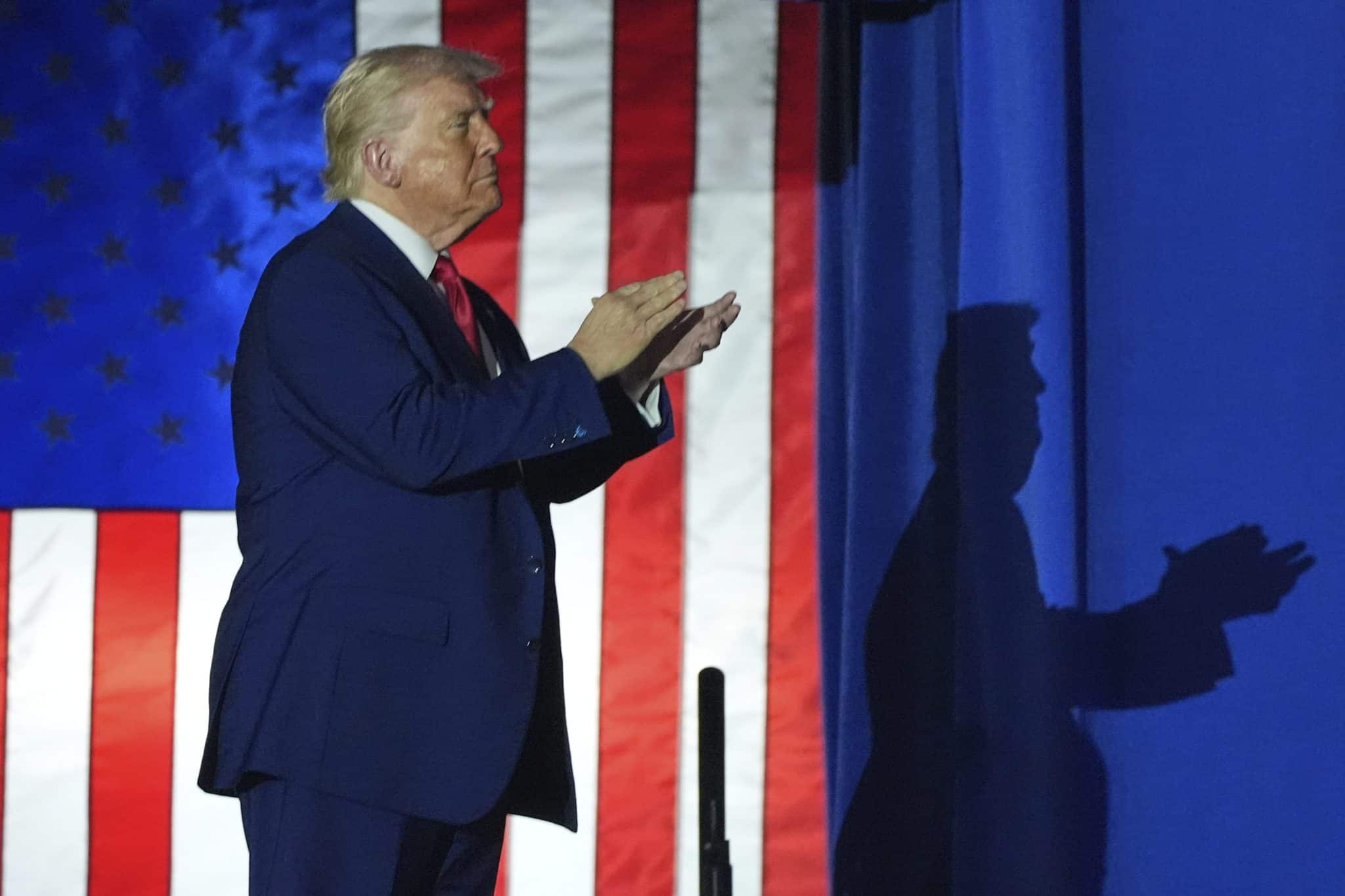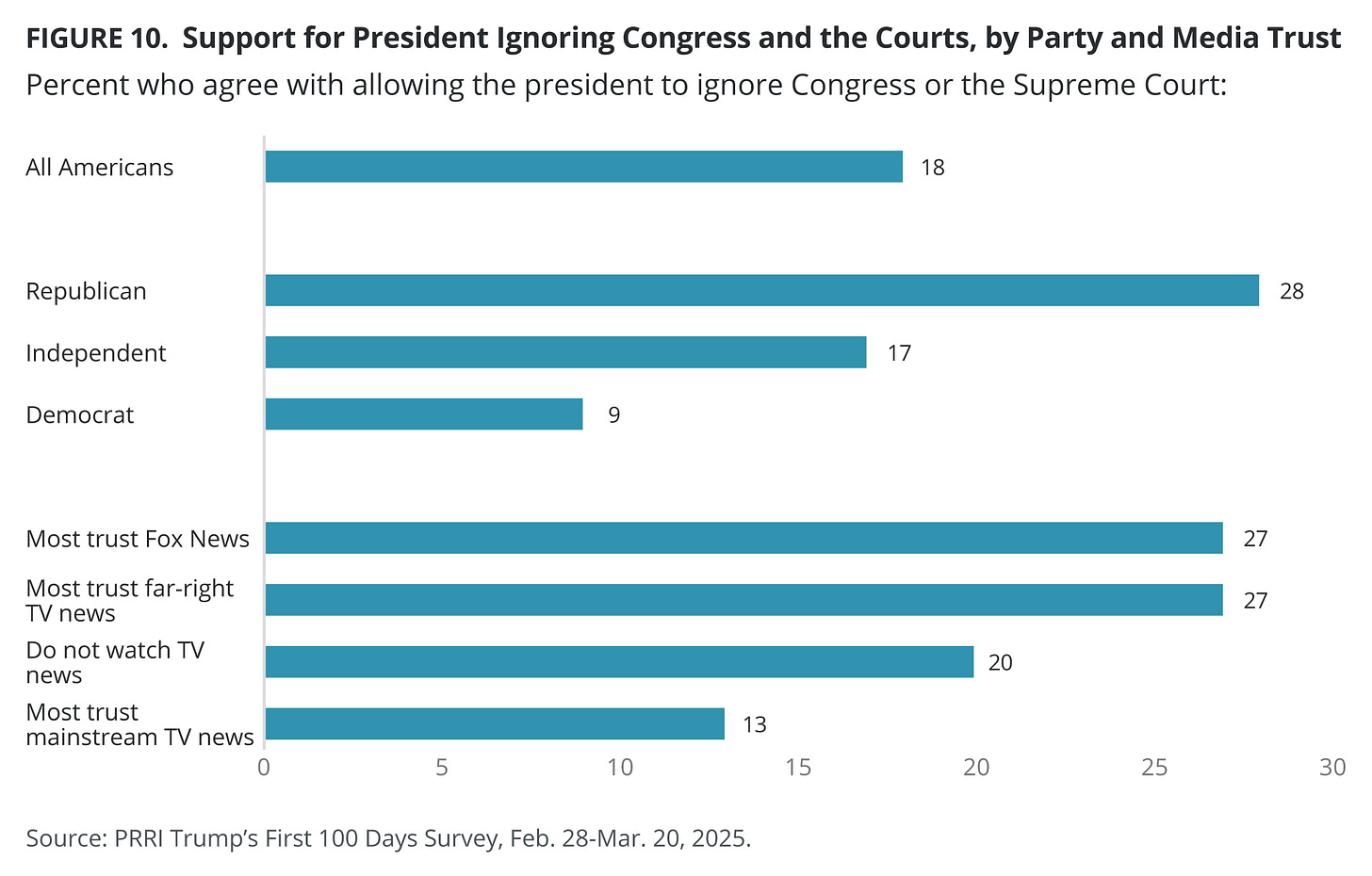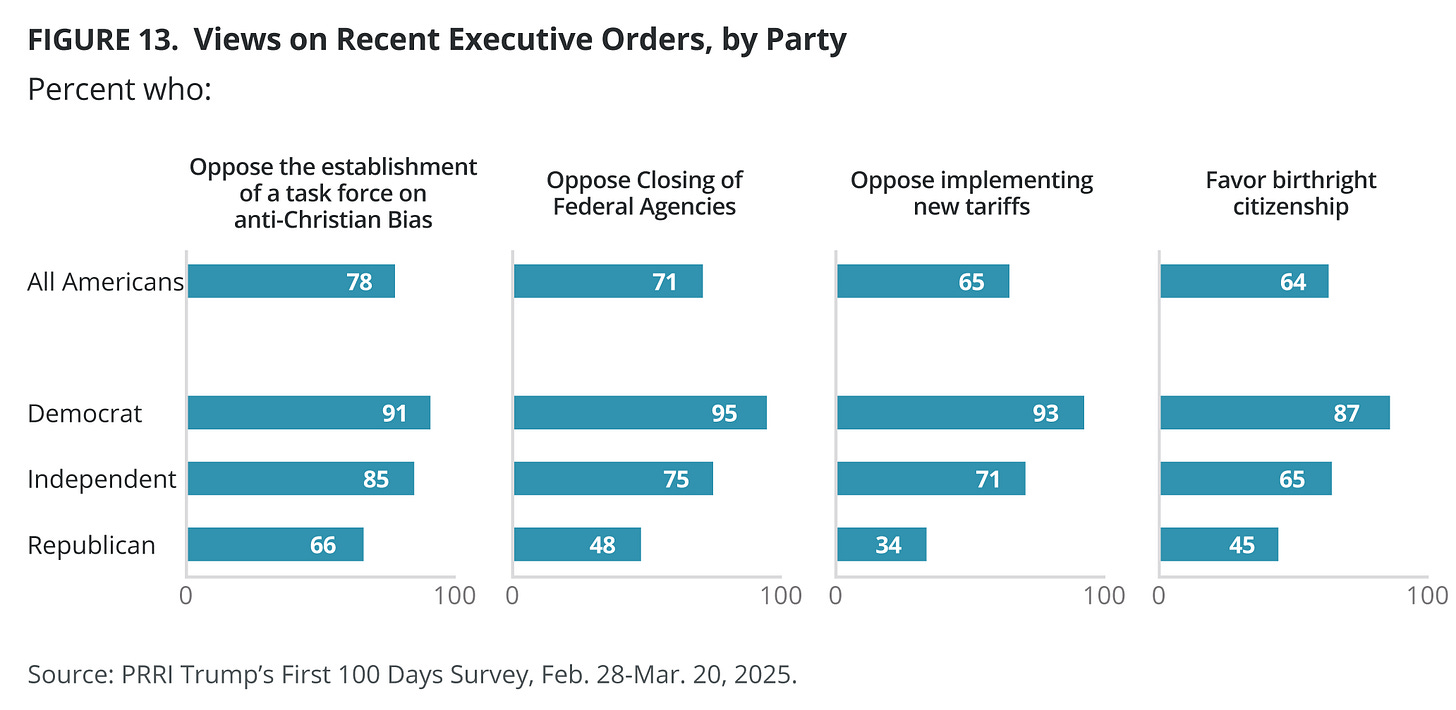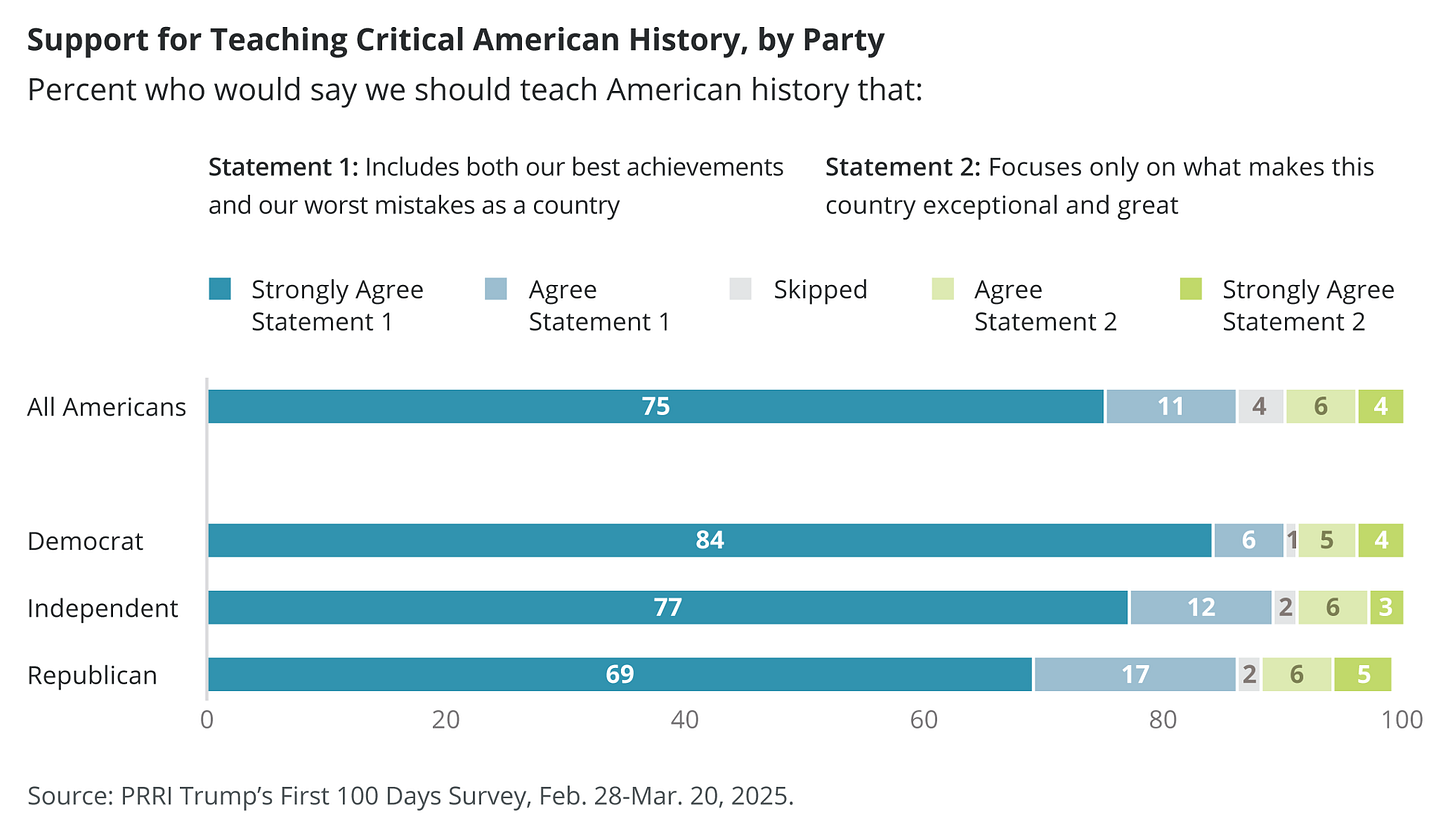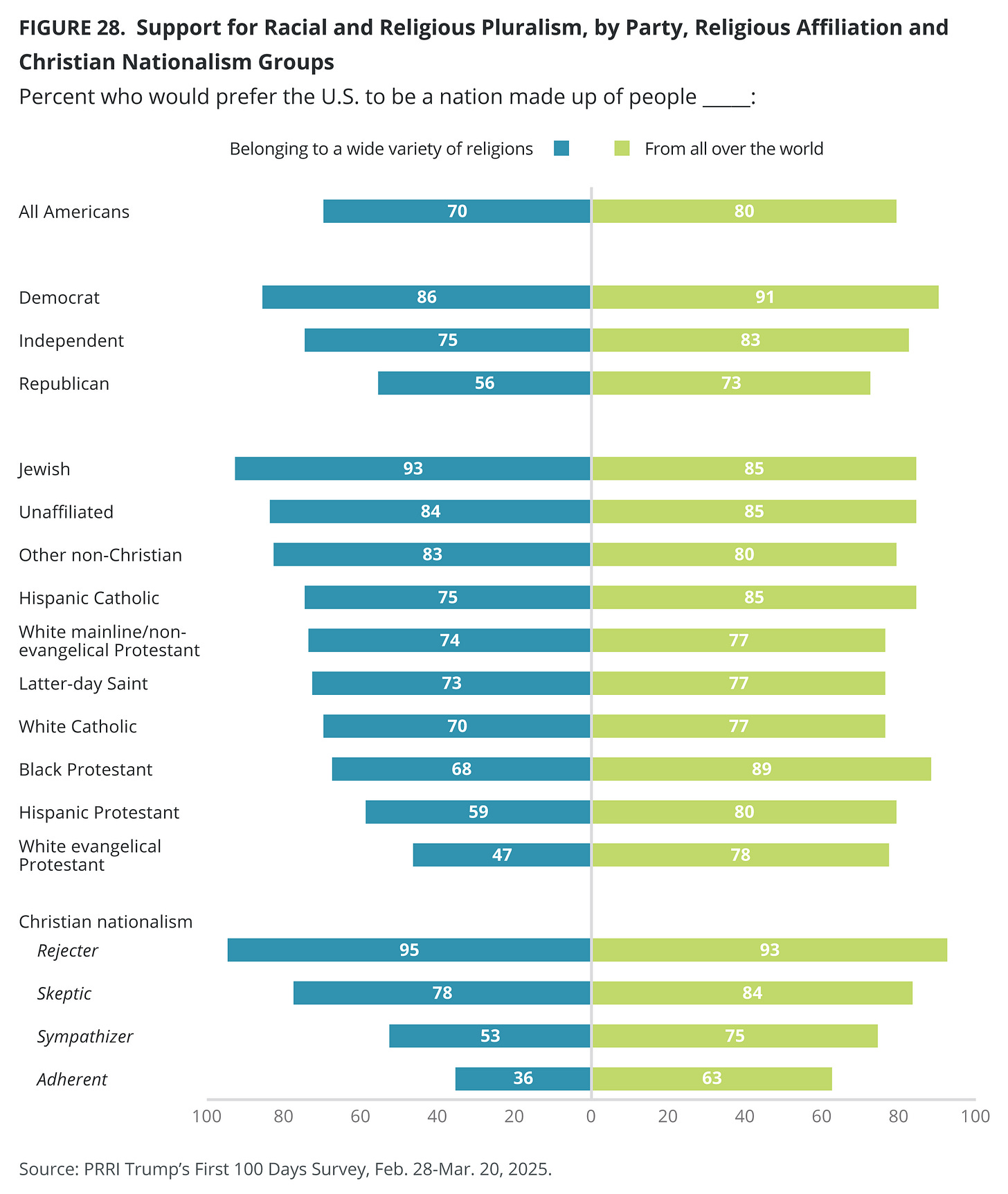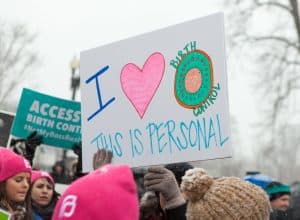In Netflix’s “Stranger Things,” the residents of fictional Hawkins, Indiana, live right above a parallel dimension known as the Upside Down, a frightening, alternative version of reality. A portal into the Upside Down brings the show’s characters to a place that resembles their hometown, but has become a decaying hellscape filled with demogorgons — bloodthirsty monsters who consume humans.
While we may not be facing literal demogorgons in today’s world, in many ways, it feels as though we are living in the political Upside Down. Americans are going about their daily lives as they always have in most respects, but many of the policy initiatives and executive orders undertaken by the Trump administration will have deleterious effects for a large share of Americans. Moreover, as our latest PRRI survey report shows, many such actions are extraordinarily unpopular.
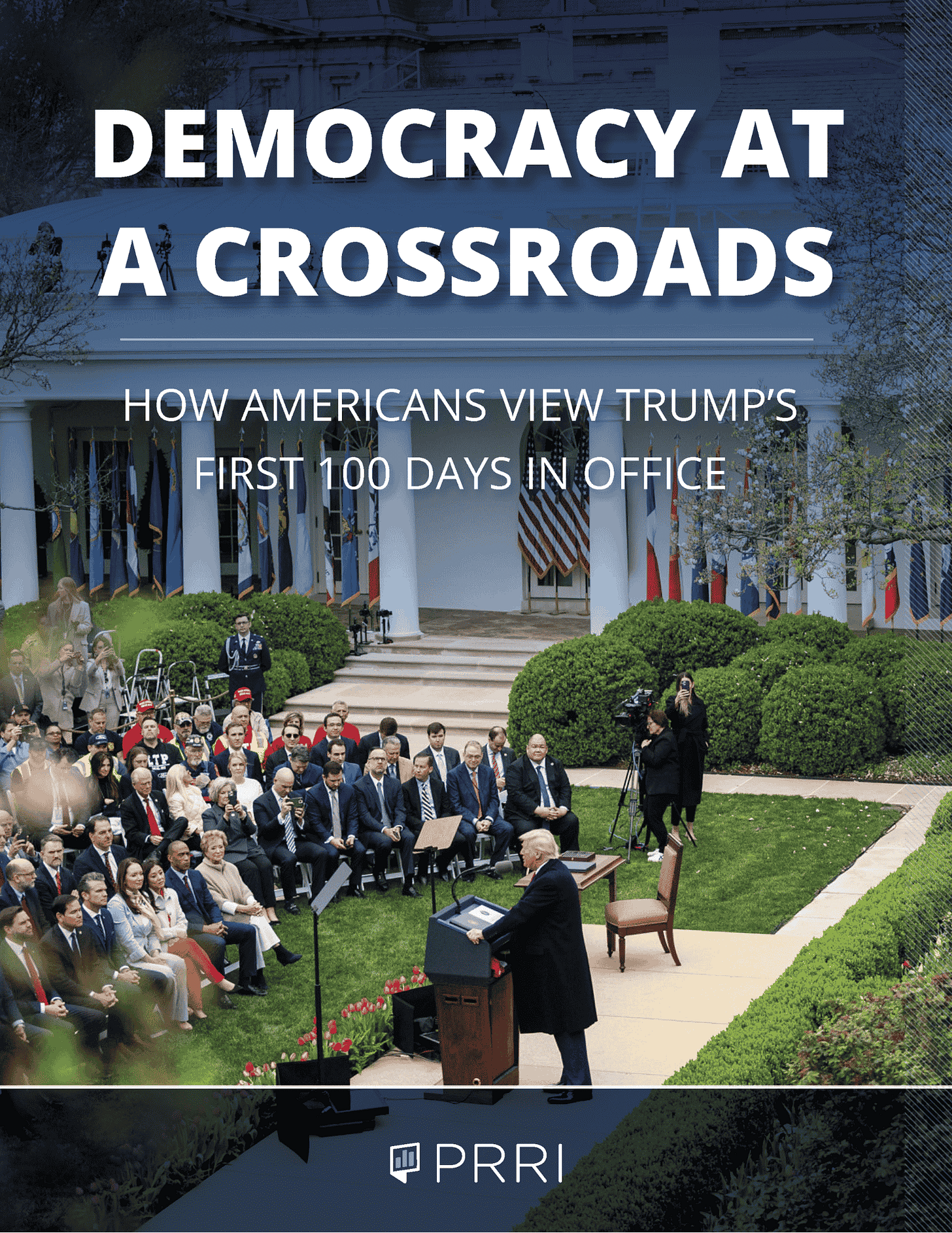
Here are five examples from our 100 Days Survey Report that illustrate this point vividly.
1. Americans strongly reject the notion that the president can ignore Supreme Court decisions, yet Trump is failing to heed a directive from a unanimous Supreme Court to facilitate the return of a man they wrongly deported.
The vast majority of Americans hold firm to the need for checks and balances among the branches of government. When we asked Americans whether the president should be able to ignore “decisions by Congress or the Supreme Court [when they] hold our country back,” only 18% agree, while nearly eight in ten Americans (78%) disagree, including 70% of Republicans.
Yet, the Trump administration’s refusal to heed a unanimous decision by the Supreme Court to facilitate the return of Kilmar Abrego Garcia, who was illegally deported by the Trump administration to a heinous El Salvador prison without due process, threatens this bedrock principle, etched in our Constitution. Unlike Congress, whose members can restrict funding for the Executive Branch or impeach the president for acting in ways that defy federal law, the Supreme Court has little recourse if the President decides to ignore its decision.
Up until now, presidential administrations have always followed the Supreme Court’s directives. The fact that 8 in 10 Americans believe that presidents should follow Court directives, even in cases in which they may disagree, underscores how important this principle is to our democracy historically.
2. Overwhelming numbers of Americans believe that no elected official, including the President, should be above the law.
Nine in ten Americans (89%) agree that no elected official, including the President, should be above the law—a view that is widely shared by Americans across parties, religious traditions, age and race.
To be fair, we did find more support among some Americans for the idea that “because things have gotten so far off track, we need a president who is willing to break some laws if that’s what it takes to save the country.” However, even on this measure, just 20% of Americans agree, though Republicans (29%) are more three times as likely as Democrats (9%) to agree. Still, it is hard to find any group in America that says presidents get a free pass in terms of breaking laws while in office.
3. Americans are not at all pleased with the work of DOGE and its efforts to radically shrink the size and scope of government.
Most Americans (71%) oppose closing or drastically shrinking all major federal agencies, even if it means things like airline travel, medicine, and water may be less safe. Here, partisan differences are starker, with nearly all Democrats (95%) and three in four independents (75%) opposing such closures or reductions, while Republicans are evenly split (48% oppose, favor).
Yet, the Trump administration, through the DOGE effort led by Elon Musk—about whom, our report shows, just 35% of Americans hold favorable views—continues to pursue mass layoffs in virtually all government agencies, including those agencies whose work directly impact the daily lives of Americans. For instance, the Trump administration recently released plans to end routine food inspections undertaken by the FDA. Americans generally like having the federal government provide important services and regulate industries that make us safer and healthier, but that seems unimportant to the current administration.
4. Americans are not snowflakes—they can handle the teaching of American history that emphasizes both our nation’s achievements and its mistakes.
In March, Trump signed an executive order to restore “truth and sanity to American history by revitalizing key cultural institutions and reversing the spread of divisive ideology.” This vision, he argues, should be about “honoring America’s extraordinary heritage and building a sense of national pride.” That directive is geared at the places that Americans of all ages learn about our history, including the museums of the Smithsonian Institution and our national parks, as well as our public schools, which are now under mandate by the Trump administration to remove diversity, equity, and inclusion programs, which can impact how American history is taught.
However, we find that Americans (86%) are far more likely to agree with the statement that “we should teach American history that includes both our best achievements and our worst mistakes” than the statement “we should teach American history that only focuses on what makes this country exceptional and great” (10%).
5. Americans remain broadly committed to the vision of a multi-religious America, largely rejecting efforts by the government to investigate anti-Christian bias apart from bias faced by other religious Americans.
Most Americans (78%) oppose “the establishment of a federal task force that focuses exclusively on discrimination against Christians rather than discrimination against all religions,” while only 16% favor it. Notably, a majority of Democrats (91%), independents (85%), and, importantly, Republicans (66%) oppose such an effort. Americans have a deep commitment to protecting the free exercise of religion as guaranteed by the First Amendment and recognize that such protections should apply equally to members of all faith traditions.
Moreover, we find that seven in ten Americans (70%) say they would prefer the U.S. to be a nation made up of people belonging to a wide variety of religions, compared with just 25% of Americans who say they would prefer a nation primarily made up of people who follow the Christian faith. White evangelical Protestants (47%) are the only religious group in our survey in which fewer than half of their members favor a religiously pluralistic society.
In February, however, the Trump administration established a Task Force to Eradicate Anti-Christian Bias, setting out to “review the activities of all departments and agencies to identify anti-Christian policies, practices or conduct,” though studies show that Jewish and Muslim Americans, particularly in the workplace, report being discriminated against far more frequently—and with more severity—than Christians.
Christian Right organizations for decades have raised alarms about attacks on their religious liberty, making the case that Christians are an embattled minority forced to conform to an increasingly secular vision promoting unbiblical teachings on marriage, sexuality and gender. Others, however, note, what is really troubling to most conservative Christians is their loss of dominance in society, which they view as persecution.
Facing the Political Upside Down Today
As stated in the Declaration of Independence, what truly sets America apart is the idea that a government is legitimate only when it derives its “just powers from the consent of the governed.”
Given the considerable scope of government—as well as the vast size of the nation—it is never a given that most Americans will agree on which policies the government should pursue or even have enough knowledge about said policies on which to hold a firm stance. That’s why the founders developed a representative form of government. Elected officials understanding where the public stands on policies, then, is an essential component of our representative system of government. That’s why public opinion polls on important and timely issues, like PRRI’s latest survey, serve an essential function in our democracy.
There will always be disagreement among Americans with respect to the work that needs to be undertaken by government in many cases, and our polling often shows that. But when government acts in ways that defy the views of the vast majorities of Americans, across party, and in ways that challenge the very sacred elements of our constitutional system of government, we find ourselves in the political upside down.
Read the full survey report here
This article was originally published at PRRI’s Substack and is reprinted here with permission.
